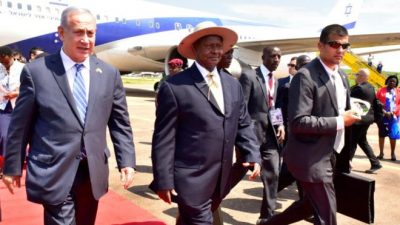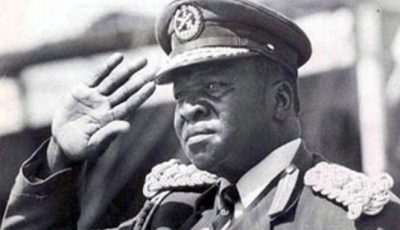Reuters photo
By
Rupen Savoulian
In early July 2016, Israeli Prime Minister Benjamin Netanyahu began a multination tour of East African countries, starting with Uganda. He made a significant stopover in Entebbe, Uganda.
Why? This was the 40th anniversary of the Israeli commando raid, a military action aimed at rescuing Israeli hostages kidnapped by Palestinian militants. The latter found sanctuary at the time in Uganda, then under the rule of General Idi Amin. Israeli forces stormed the Entebbe airport, and during this action three hostages, all the hijackers, 45 Ugandan soldiers and one Israeli commando were killed.
The Entebbe raid, as that military operation has become known, was praised by PM Netanyahu as a significant action against terrorism. Visiting the site of Entebbe in July this year, Netanyahu gave an emotionally-charged speech – which is understandable, given that his brother was one of the commandos who died during the military operation. But he also recycled a number of propagandistic myths and distortions that are possible only by taking a pair of scissors and excising huge portions of recent history from the picture.
Tuck published an article that covered Netanyahu’s visit, an article that sadly uncritically reproduces the Netanyahu version of history. Let us have a look at the claims made by Prime Minister Netanyahu, and how those claims do not stand up to scrutiny. He stated that this raid was a great victory against terrorism, and that the international community needs to cooperate to defeat this particular evil in the world. Netanyahu also stated that Israel intends to increase its economic, political and military relations with sub-Saharan and East African countries. He boasted that he was the first Israeli Prime Minister in over twenty years to make an official state visit to Africa. The purpose of this contribution is not to sound peevish or annoyed, or to make any personal attacks. The purpose is to examine those relevant portions of history that Netanyahu deliberately excluded from his speech in Uganda.
There is no doubt that General Idi Amin’s rule in Uganda was a military dictatorship, where opponents of the regime were tortured and eliminated. There is no question that Amin became, in his own erratic and schizophrenic way, a supporter of the Palestinian cause and made repugnant, repulsive anti-Semitic statements praising Hitler, revealing himself to be a very troubled, hateful person. He was most definitely the head of a monstrous regime. But what is missing from Netanyahu’s truncated picture is that during Idi Amin’s rise to power, he had two powerful patrons and supporters – Britain and Israel. He was a monster created, aided and abetted by influential backers – patrons that he eventually turned against.
In an article for The New Yorker magazine published in June 2016, author Helen Epstein relates that:
One issue that probably won’t be discussed during Netanyahu’s visit is why the hijackers chose Entebbe. The short answer is that Idi Amin, Uganda’s erratic dictator at the time, was a staunch supporter of the Palestinian cause and a professed enemy of Israel. But there is a longer answer: Israel itself helped install Amin in power, creating a monster who turned on his former patrons.
Israel had had a special relationship with Uganda since the latter’s independence from Great Britain, in 1962. Beginning in the nineteen-fifties, David Ben-Gurion, then Israel’s Prime Minister, sought strategic partnerships with states on the edge the Arab world, including Uganda, Kenya, Iran, and Turkey, to counter the hostile nations on Israel’s own borders. As part of what became known as the Peripheral Doctrine, Israel trained and equipped Uganda’s military and carried out construction, agriculture, and other development projects.
Israeli technicians were helping to construct, among other things, the Entebbe airport, so its blueprints and structure were well known to the relevant Israeli authorities.
Amin was a British-trained soldier, having risen through the ranks of the British-commanded King’s African Rifles, a multi-battalion unit raised from Britain’s East African colonies. This unit, loyal to British King and Country, was deployed in various actions in defence of the Empire, namely fighting the Kenyan Mau Mau insurgency in the 1950s. Amin saw action in that war, and proved himself a capable leader. The British were well aware of the type of man they were promoting, and in the early 1960s, when Uganda gained independence, it was Amin among other officers who was promoted to the very top of the fledgling Ugandan military hierarchy.
General Idi Amin – Reuters photo
Israel was a keen supporter of Ugandan independence, and established a burgeoning relationship with the new country. Armaments and money flowed into Uganda, and Amin himself was fully supportive of this relationship. The civilian authorities in Uganda at the time, while professing Pan-Africanist sentiments, found themselves heavily dependent on the Ugandan army. Amin established close relations with Colonel Baruch Bar-Lev, Israel’s military attache in Uganda. While the civilian Presidents tried to maintain their autonomy from the military, Amin and other army officers were secretly plotting to seize power for themselves. Bar-Lev had advised Amin to form a particular unit, trained by Israel, to protect Amin himself. It was this unit that provided the backbone for the 1971 coup d’etat that brought Amin to power. It is no exaggeration to state that while Amin hungered for power himself, it was his Israeli enablers that made such a seizure of power a practical reality.
Amin, having become chief of staff of the Ugandan army in the 1960s, was viewed as a great asset by the British and Israeli authorities. Amin ran a sideline operation in his position; he supplied armaments and training for rebel groups operating in the South Sudan, a predominantly African region ruled by the Arabic-speaking regime in Khartoum. Israeli-made weapons found their way into the hands of South Sudanese rebel forces via Uganda, and the Arab-majority Sudanese army was bogged down in a grueling conflict with secessionist rebels. In fact, until today, with South Sudan an independent state, its main military and political supporter has been the state of Israel. The support for South Sudanese rebels fighting the dictatorial regime in Khartoum is motivated by Israeli strategic and economic interests, not any humanitarian concerns for subjugated peoples.
It is no longer a secret that Israel maintained a flourishing and profitable relationship with apartheid South Africa for many decades, while the rest of the international community demanded an end to any links with that racist regime in Pretoria. That particular international cause for democracy and racial equality was ignored and sabotaged by the Israeli authorities – however, now, Netanyahu wishes to invoke the moral authority of the international community’s support for his alleged stance against terrorism. Israel’s outreach to African countries is based on cynical and ruthlessly calculated political interests. The Israeli authorities are looking for friends to outflank all the Arabic-speaking countries. That calculation is no secret – Israel was fully supportive of the newly-independent African states back in the 1960s; those relations have gone through various fluctuations and changes since then, but the underlying rationale has remained the same.
Thankfully, Amin’s regime has passed into the pages of history. After his overthrow in 1979, he was exiled and never saw his native Uganda again – he remained forgotten and irrelevant. He spoke out on various issues concerning his country, but now no-one was listening. Uganda itself has remained firmly in the orbit of the United States; current Ugandan President Yoweri Museveni has been in power since 1986. As Helen Epstein explains in her New Yorker article:
Early in Museveni’s tenure, Uganda once again became a pawn in the seemingly endless undeclared war between the Arab world and the West. In 1994, the Clinton Administration began funding Uganda and other countries to destabilize the government of Sudan’s Omar Hassan al-Bashir, whom it held partly responsible for the bombing of the World Trade Center, in 1993. Ugandan troops have also been deployed, at the West’s beckoning, in Somalia, Iraq, and Afghanistan. In return, the U.S. plows roughly seven hundred and fifty million dollars annually in developmental aid into Uganda, including a hundred and seventy million dollars in military aid. Meanwhile, the Ugandan leader has for years received a free pass when it comes to human-rights abuses. These include allegations of election rigging, torture, and the killing of opposition supporters.
Was the Entebbe raid a victory against terrorism, as Netanyahu boastfully claims? Yes and no. What does that mean?
Yes, it was a victory against terrorism – if by that, you mean the terrorism of the dispossessed, desperate and vulnerable. The Palestinians, stuck in squalid refugee camps, denied a basic existence, their future hopeless and abandoned by the international community, resorted to desperate tactics, lashing out at any target however soft its vulnerability. Back in the 1960s and 1970s, the very existence of the Palestinians as a nation was routinely denied by top-level Israeli politicians. Condemned to rot in refugee camps, with no education, prospects of hope of a bright future, the Palestinians struck out in dangerous, desperate and lawless ways, the only methods available to those that have been pushed out to the margins of existence.
Was it a victory against terrorism? No. The terrorism of the rich and powerful, those with the resources of a state at their disposal, goes unpunished and unaccountable. When refugee camps are bombed by warplanes, those who gave the orders for such actions remain at large, uninhibited by legal sanction. When an entire territory is blockaded and starved into submission, those who order and carry out such measures remain unpunished. When such punitive measures deny an entire population the basic necessities for survival, and undermine the ability of a society to sustain itself, the international community must do more than just watch. We would do well to remember the words of the late great humanist activist and author, Peter Ustinov, who stated that; “Terrorism is the war of the poor, and war is the terrorism of the rich.”




No Comments Yet!
You can be first to comment this post!